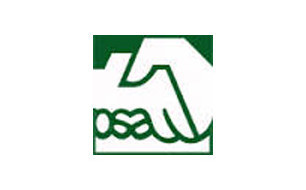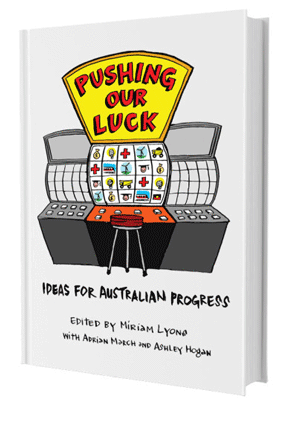Centre for Policy Development's Blog, page 59
November 25, 2013
South Australian Public Sector Conference | 3 December, Adelaide

‘Increased productivity through innovation’
When:
Tuesday 3 December, 9am – 1pm
Where:
Adelaide Pavilion, Cnr of Peacock Rd & South Terrace, Adelaide
Morning tea and refreshments provided
Keynote Speaker:
Christopher Stone, Research director, CPD Public service program
The conference will provide an opportunity to discuss current issues affecting public sector services for the community and other possible impacts on the public sector, such as the upcoming State Election in 2014.
For more information and to REGISTER, contact Amelia Brown: 8205 3239 or amb@cpsu.asn.au or download SA PS Conference flyer

NineMSN | 26 November 2013
 Marine protection dividend
paper – making waves online
Marine protection dividend
paper – making waves onlineCPD Marine economy fellow Caroline Hoisington’s paper found that 15 years is a minimum period to assess the impact of marine parks, and that the reserves also deliver clear social & economic benefits to their local communities.
The NineMSN account reveals:
More than six months after the NSW government opened up marine sanctuaries to recreational fishing, a new report is warning the pastime can have as much damage as its commercial counterparts.
Read the NineMSN article on the Marine protection dividend paper online
Short-term thinking cannot address Australia’s long-term dilemmas – Help us look further ahead!

Marine protection dividend | OCCASIONAL PAPER
 Don’t quit before the full benefits flow
Don’t quit before the full benefits flowCPD’s latest ‘marine economy’ report by former World Bank economist Caroline Hoisington, finds that marine parks deliver more over time
As the NSW government considers marine management reforms, this report finds that marine parks already provide significant economic benefits, but it is too early to judge their environmental effectiveness.
This short paper presents compelling evidence that:
NSW marine parks are already delivering clear and demonstrable economic benefits for local communities and businesses.
The protected areas must be allowed to exist for a minimum of 15 years before they can be judged as to their effectiveness.
Community support for marine parks and the sanctuary zones within them, is very high around the more established reserves.
NSW marine parks are all relatively young. The oldest NSW marine parks are barely 11 years old and the youngest only six. In ecological terms, these parks are still in their infancy.
Yet marine parks are already providing economic dividends to local communities, by attracting significant tourism. The establishment of the Solitary Island Marine Park, for example, saw a 20% increase in local business’s turnover in the first five years. Jervis Bay Marine Park has brought an estimated $2.4 million into the region through marine tourism.
“Marine parks have become essential infrastructure for regional economies. As long as investment in the parks is maintained, benefits will continue to increase over years and even decades,” said report author Caroline Hoisington.
Recreational and commercial fishing also benefit from marine parks, particularly sanctuary zones, where fishing is restricted. European studies have shown that for each year a sanctuary zone is in place, the number and/or size of commercially valuable fish increased by 8 per cent compared to surrounding fished areas. Benefits flow when these fish spill over into surrounding areas.
“Local community support for sanctuary zones is 80 per cent or higher, in the three marine parks where opinions have been surveyed”, Caroline said. “The numbers are no different for recreational fishers.”
Recreational fishing may also see bigger and better catches immediately, as competition from commercial fishing is reduced. However, sustainable fish stock management must also take account of recreational fishing, which makes up as much as 90 per cent of the catch for some NSW species.
The report recommends the NSW Government set 15 years after zoning as the earliest point for making judgments about the impacts and environmental effectiveness of marine parks. Improvements in biodiversity, biomass and resilience of fish species will continue to take place after this time. The first fifteen years is not the end of benefits from marine parks, but is just enough time to show big changes.
By contrast, decisions based on short-term assessments risk being driven by emotional reactions, rather than taking a balanced view based on evidence of the dividends that will continue to flow from marine parks.
CPD OP34 Marine Protection Dividend

November 23, 2013
The Political Sword | Review of Pushing our luck
 Political Sword review of
PushingOurLuck
Political Sword review of
PushingOurLuck
The stalwart left-leaning blog recommends Pol for a clear alternative to the new government’s vision of an Australian future, and for its readers’ Christmas gifts!
“This collection of articles, although only ten in number, is vital in developing an overall progressive vision for the future of Australia, one building on our luck not relying on it, and again making Australia an egalitarian society. I strongly recommend it for your Christmas list.”
Read the Political Sword review of Pushing our luck

The Political Sword | Review of Pushing our luckem>
 Political Sword review of
PushingOurLuck
Political Sword review of
PushingOurLuck
The stalwart left-leaning blog recommends Pol for a clear alternative to the new government’s vision of an Australian future, and for its readers’ Christmas gifts!
“This collection of articles, although only ten in number, is vital in developing an overall progressive vision for the future of Australia, one building on our luck not relying on it, and again making Australia an egalitarian society. I strongly recommend it for your Christmas list.”
Read the Political Sword review of Pushing our luck

November 19, 2013
The Conversation | 12 November 2013

Are we getting the best “bang for our bucks”?
Christopher Stone, CPD research director recently released report False economies part 3: Bang for our bucks providing an overview in The Conversation answering the question ‘How efficient is Australia’s public sector?’. By international comparison Australia performs very well and is on par with the private sector.
“The World Bank’s measurement of government effectiveness places Australia as ninth most effective amongst OECD nations in 2010.
However, what is interesting is that Australia’s taxation levels are much lower than those of northern Europe. Instead, these levels are similar to low-taxing nations such as Korea and the US. In fact, Australia was the fifth lowest taxing nation in the OECD in 2010.”
Read the article at The Conversation
Download False economies part 3: Bang for our bucks
Help us counter evidence-free attempts to downsize and privatise our public services – Become an Ideas Sustainer.

Macro Business | 11 November 2013

Recent report False economies part 3: Bang for our bucks gives a clear indication that Australia performs well in terms of public sector efficiency when compared with other nations. Christopher Stone, CPD research director and author, explains how we tend to compare ourselves to high taxing nations such as Denmark and Norway when looking at areas including health and education. The reality is that our taxation levels are closer to the United States and Korea.
“With its Commission of Audit, the Abbott government has made the efficiency of the public service a priority. But nowhere in the terms of reference is any attempt to establish how efficient government activities currently are.
There is a very large difference between seeking to reform a highly inefficient government, where fundamental changes may be required, and reforming a very efficient government and refining existing activities.”
Read the article at Macro Business
Find out more False economies part 3: Bang for our bucks

Get a copy of new CPD book Pushing our luck!
 Pushing our luck: ideas for Australian progress
Pushing our luck: ideas for Australian progressGet your hands on the hard stuff – hard copy books, ePub and MOBI e-books are now available online
Buy a copy of Pushing our luck: ideas for Australian progress because:
it’s a great read
it gives important thinkers space to imagine better ways to do things, based on real evidence, for a fairer and more sustainable Australia
it goes beyond sound bites and slogans to look at the real issues that will shape Australia’s future
your purchase will help CPD to keep on making good ideas matter.

To order a copy now, please visit the ‘CPD shop’ here

November 10, 2013
False economies part 3: Bang for our bucks | LANDMARK REPORT
 Cheap at half the price?
Cheap at half the price?
CPD’s public service research director Christopher Stone contends that despite rhetoric to the contrary, the Australian public sector is efficient.
Investigation of Australian public sector in terms of results against resources finds it to be more efficient than the public sectors of most similar nations. This means that our public sector does a good job of delivering essential community needs with minimal resource inputs, and is adaptable to changing circumstances.
This paper continues CPD’s False economies series by setting out evidence on the efficiency of our public sector. Internationally we stack up very well on efficiency:
Among OECD nations, Australia is the only one to be in the top ten most effective governments, but the bottom five lowest taxing governments. This is strong evidence that we have a far more efficient government than most of our peer nations.
The paper also points out that our public sector is as efficient as the private sector once the different responsibilities are taken into account. In general the harder jobs are left to public sector organisations, more is expected of them, and when this is factored in their performance is similar to that of private sector organisations.
This research builds on previous papers in the series: Decoding efficiency, which busts the myths surrounding the often-misconstrued term, and Doing less with less which gives detailed examples of how such misunderstandings can create waste.
The False economies series is pointing out that the way we discuss efficiency in public services is damaging the nation. The term’s misuse justifies poor and ill-considered policy approaches, which can actually drive inefficiency and waste, and distracts us from genuine efficiency improvements that can be made.
CPD OP33 (‘False economies’ part 3) Bang for our bucks
Download Bang for our bucks media release
Help us counter evidence-free attempts to outsource, downsize and privatise our public services – Become an Ideas Sustainer

False economies part 3: Bang for our bucks
 Cheap at half the price?
Cheap at half the price?
CPD’s public service research director Christopher Stone contends that despite rhetoric to the contrary, the Australian public sector is efficient.
Investigation of Australian public sector in terms of results against resources finds it to be more efficient than the public sectors of most similar nations. This means that our public sector does a good job of delivering essential community needs with minimal resource inputs, and is adaptable to changing circumstances.
This paper continues CPD’s False economies series by setting out evidence on the efficiency of our public sector. Internationally we stack up very well on efficiency:
Among OECD nations, Australia is the only one to be in the top ten most effective governments, but the bottom five lowest taxing governments. This is strong evidence that we have a far more efficient government than most of our peer nations.
The paper also points out that our public sector is as efficient as the private sector once the different responsibilities are taken into account. In general the harder jobs are left to public sector organisations, more is expected of them, and when this is factored in their performance is similar to that of private sector organisations.
This research builds on previous papers in the series: Decoding efficiency, which busts the myths surrounding the often-misconstrued term, and Doing less with less which gives detailed examples of how such misunderstandings can create waste.
The False economies series is pointing out that the way we discuss efficiency in public services is damaging the nation. The term’s misuse justifies poor and ill-considered policy approaches, which can actually drive inefficiency and waste, and distracts us from genuine efficiency improvements that can be made.
CPD OP33 (‘False economies’ part 3) Bang for our bucks
Download Bang for our bucks media release
Help us counter evidence-free attempts to outsource, downsize and privatise our public services – Become an Ideas Sustainer

Centre for Policy Development's Blog
- Centre for Policy Development's profile
- 1 follower




